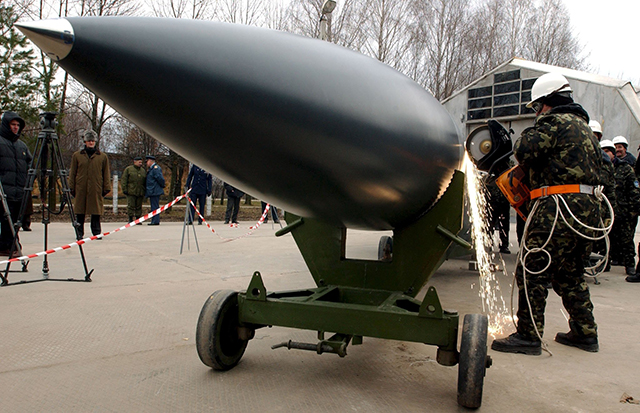They called it the Lisbon Protocol.
In 1991, the U.S. and Russia agreed to historic reductions in nuclear weapons. But there was a hitch: Russia didn’t exactly own all of its nukes. When the Soviet Union collapsed, lots of them were left in the former vassal states of Belarus, Ukraine and Kazakhstan. Under the protocol, all the nukes from these countries would be transferred to Russian control or destroyed.
Ukraine promptly negotiated a pact to make this happen. Moscow and the West pledged to respect and preserve Ukrainian sovereignty and borders. In return, Kiev handed over its nuclear arms.
Last week, it became abundantly clear that the deal was off — at least as far as Moscow was concerned. Russian tanks rolled into Crimea.
The lesson here isn’t “never give up your nukes.” During the Cold War, several nations — including Brazil and South Korea — shrewdly calculated that they could rest easy under the West’s security umbrella and therefore didn’t need a nuclear deterrent of their own. Likewise, NATO was content to shed intermediate-range nuclear forces after the fall of the Berlin Wall.
But Ukraine gave up its weapons with only a piece of paper as its safety net. That’s seldom enough.
Consider the divergent fates of Ukraine and Poland. When the Cold War ended, both nations had essentially equivalent population size, GDP and economic potential.
Poland aligned itself with the West, ultimately joining NATO. It became a first class democracy with a free-market economy. The Wall Street Journal/Heritage Foundation “Index of Economic Freedom” rates it as the 50th freest economy in the world.
Ukraine, meanwhile, stayed under the shadow of Russia. While technically a democracy, it has suffered under a corrupt political class little better than the looters in Moscow. The Index rates its economy as “repressed.” Its ranking: a lowly 155th.
Today, nuclear-free Poland is free. Once nuclear-armed Ukraine … not so much.
Unfortunately, the Iranian mullahs are bound to draw a different lesson from the unfolding story of Ukraine. And the immoral moral they will draw is: Outsiders won’t mess with your internal politics if you have nuclear weapons.
Take the case of North Korea. Ukraine is Disneyworld compared to that nation when it comes to internal repression, poverty, corruption and human rights abuses. But, no one suggests messing with Pyongyang … because it has the bomb.
And the Iranians are very interested observers. The 2009 “Green Revolution” revealed the citizens’ deep hated of their regime and the desire to dump it. The mullahs can’t be sure that the outside world will allow them to keep oppressing their own people … unless they get the bomb.
Further, Tehran has an expansionist foreign policy that includes state-sponsored terrorism and threatening and bullying its neighbors. It needs an insurance policy, lest other states try to push back too hard.
Becoming a nuclear-armed power is a core interest of the Iranian regime in Tehran. That’s why it’s near impossible to envision how negotiations will ever convince the mullahs to stop their drive for nuclear weapons.
Sure, had Iran followed Poland’s path and produced a government interested in serving rather than suppressing its people, in pursuing regional peace and prosperity rather than domination and confrontation, then a lasting, negotiated deal with the West might be possible. But that is not the Iran we have.
The Iran “problem” is not going away anytime soon. And, neither will the other “hot spots” around the world that threaten to roll back the advance of freedom logged in the last century. Ukraine is an unhelpful lesson for Tehran, and yet another addition to President Obama’s growing list of foreign policy crises to be addressed.
JAMES JAY CARAFANO, a Washington Examiner columnist, is vice president for defense and foreign policy studies at the Heritage Foundation.
